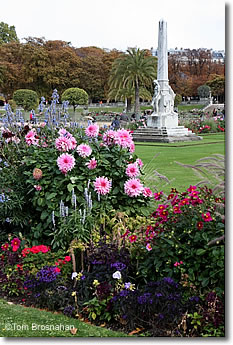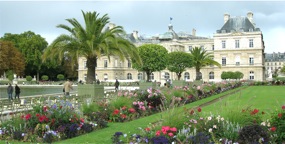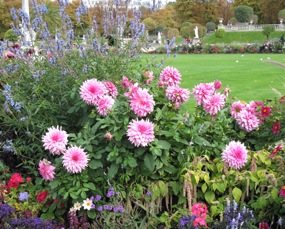 |
Jardin du Luxembourg, Paris | |
| Paris's largest public park is great for a stroll, peace and quiet, a light meal, and for kids. | ||
|
|
||
|
|
|
Paris's most popular spot for an afternoon stroll or an outing with the kids is the Jardin du Luxembourg (Luxembourg Gardens), the largest public park in the city (map). Located on the Left Bank in the heart of the Latin Quarter, in both the 5th and the 6th arrondissements, the Luxembourg attracts both locals and visitors year round. The Jardin du Luxembourg is just south of the Palais de Luxembourg, a beautiful structure that now houses the French Senate. The gardens are also near the Panthéon, as well as the Sorbonne, and in walking distance to Boulevard St. Michel and other Left Bank attractions. The Jardin du Luxembourg is perhaps best known as a place for children. There's a playground (parc à jeux) and puppet theater (Théâtre des Marionettes), as well as pools and fountains. There's also an old-fashioned carousel. The Luxembourg Gardens offer a couple of small restaurants where you can stop for a light lunch, a coffee, or a glass of wine. In warm weather the terrace is full of people enjoying the view and the weather, while on cooler days the indoor restaurant provides lively service and tasty food. The combination of beautiful formal French plantings, long rows of mature trees, a pool (grand bassin) where children can sail boats, and a wealth of sculpture create a harmonious and attractive setting. The Medici Fountain reflects the Italian heritage of Queen Marie de Medici, while statues of the Queens of France and other noble women regally overlook the pool. On the terrace, the addition in 2007 of a large bronze head, Le Prophète, provides an interesting counterpoint to the classical statuary. Queen Marie de Médici, wife of Henry IV, commisioned the Palais du Luxembourg and the beautiful gardens. Modeled after the Pitti Palace in her native Florence, the Palais today houses the French Senate. Though Marie lived in the palace for only a short time before she was banished to Germany by the powerful Cardinal Richelieu, the gardens remain, Queen Marie's gift to later generations.
|
|
Above: Jardin du Luxembourg, Paris.
|


